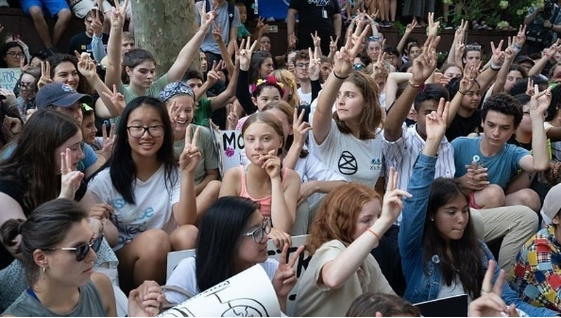What is the role of minors in politics?
- Miguel Barata
- May 28, 2023
- 3 min read
“To what extent should minors be involved in political rallies and what do they bring to the table?”

The involvement of minors in politics and protests has long been a source of controversy. While some contend that young people should have the chance to voice their opinions and engage in action, others contend that they lack the maturity to comprehend the intricacies of political concerns. In truth, a lot of young people care deeply about issues that concern their neighborhoods and the wider globe, and they want to have a voice in decisions that have an effect on their lives. For instance, social justice, gun control, and climate change are just a few of the concerns that have inspired young people to protest and demand change. These topics are all very important to discuss, yet these protests have the chance of becoming violent due to the topic matter at hand being a sensitive subject to some. It is crucial to take into account a few aspects when deciding how much young people should participate in political protests and other activities, so that these accidents can be avoided. Young people should be encouraged to participate in political activities like lobbying, volunteering, and attending town hall meetings, but only with the right supervision and direction. Adults can guide minors through the complexities of the political system, assist them comprehend the current issues, and help them form their own thoughts and beliefs so that they can represent their own views and attempt to change the world for the better. However, it's also crucial to acknowledge that children might not have the same knowledge and experience as adults. They might not completely comprehend the effects of their choices or the results of their actions. To enable individuals to make educated decisions and engage in responsible activism, it is crucial to give knowledge and resources.
Several famous child-led protests have happened throughout history and some have even been successful, some examples being the March for Our Lives movement, which was initiated by students from Parkland, Florida's Marjory Stoneman Douglas High School in the wake of a horrific shooting in February 2018, is one instance of young people engaging in political action. The students planned a demonstration in support of tighter gun control regulations in Washington, D.C., as well as other American cities. The initiative attracted a lot of attention and began a national dialogue about gun violence and the need for legislative action.
The youth-led climate strikes that have occurred around the world are another illustration. Fridays for Future is a movement founded by Swedish activist Greta Thunberg in 2019 that encourages students to skip class on Fridays in order to participate in protests and urge for action on climate change. Thousands of young people participated in protests and strikes as the movement soon expanded to other nations.
These cases show that young people may be effective change agents and that their activism can have a big impact on political debate and public policy. However, it's crucial to remember that demonstrations can occasionally turn violent, and children may not have the same knowledge and experience as adults. Therefore, to prevent youth from being exposed to unneeded risk, it is crucial for adults to offer advice and support.
Additionally, others make the point that minors might not be able to comprehend the ramifications of their acts or the complexity of political matters. However, it's crucial to understand that problems like gun violence and climate change frequently have a significant impact on young people, and that they have a right to express their concerns and demand solutions.
In conclusion, young people can be active participants in politics and protests, and their activity can have a big impact on societal and governmental change. To protect their safety and wellbeing, however, as well as to aid in their development of a nuanced understanding of the problems at hand, it is crucial for adults to offer children direction and assistance. In the end, it is up to adults to give children the tools and knowledge they need to participate responsibly and intelligently in our democracy.
Work Cited:
authors, All, et al. “The Young Protester: The Impact of Belongingness Needs on Political Engagement.” Taylor & Francis, https://www.tandfonline.com/doi/full/10.1080/13676261.2020.1768229.
“Climate Strike: Greta Thunberg's Fridays for Future Strike Returns on Friday.” BBC Newsround, BBC, 21 Sept. 2021, https://www.bbc.co.uk/newsround/58634982.
Gray, Sarah. “Everything You Need to Know about March for Our Lives.” Time, Time, 29 Apr. 2021, https://time.com/5167102/march-for-our-lives-parkland-school-shooting-protest/.
Lynda Dunlop Senior Lecturer in Science Education, et al. “Environmental Action: Why Some Young People Want an Alternative to Protests.” The Conversation, 6 Oct. 2022, https://theconversation.com/environmental-action-why-some-young-people-want-an-alternative-to-protests-161958.
News, RTÉ “Thunberg Joins Hundreds of Teens at UN Protest.” RTE.ie, RTÉ, 30 Aug. 2019, https://www.rte.ie/news/2019/0830/1072933-greta-joins-protesters-at-un/.
“Waves of Protests around the World Are Reminder That Voices of Children and Adolescents Must Be Heard and Their Rights Protected.” UNICEF, https://www.unicef.org/press-releases/waves-protests-around-world-are-reminder-voices-children-and-adolescents-must-be.





Comments